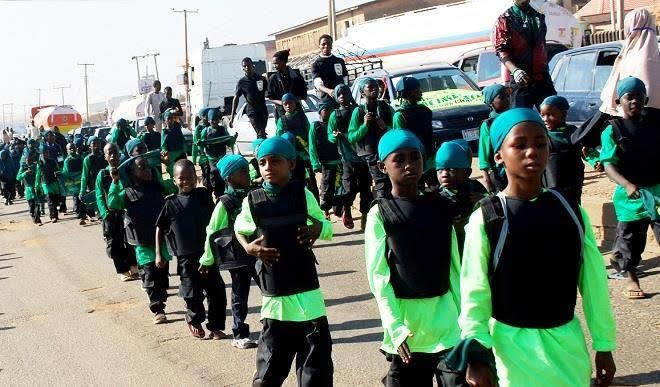Islamic Movement in Nigeria: Ending the killing spree
An investigation by Amnesty International published yesterday narrates the horrific use of excessive force by soldiers and police which led to the killing of at least 45 supporters of the Islamic Movement in Nigeria (IMN) over two days, as the Shi’a Muslim group held peaceful religious processions around Abuja. The report states that: “We have […]

An investigation by Amnesty
International published yesterday
narrates the horrific use of
excessive force by soldiers and
police which led to the killing of at least
45 supporters of the Islamic Movement in
Nigeria (IMN) over two days, as the Shi’a
Muslim group held peaceful religious
processions around Abuja. The report
states that: “We have seen a shocking and
unconscionable use of deadly force by
soldiers and police against IMN members.
Video footage and eyewitness testimonies
consistently show that the Nigerian military
dispersed peaceful gatherings by firing live
ammunition without warning, in clear
violation of Nigerian and international
law.”
The chilling report concludes that the
pattern of shooting “clearly shows soldiers
and police approached IMN processions
not to restore public order, but to kill.”
Amnesty International has evidence that
the military used automatic firearms
during Monday’s protest, in which at least
122 protesters sustained gunshot wounds
and at least 39 were killed. At least six
people were killed in protests on Saturday.
International law is clear that security
forces policing demonstrations must not
use firearms against protesters unless
they pose an imminent threat of death or
serious injury, and only if there is no lesser
way to avert such threat.
The report of Premium Times by Samuel
Ogundipe also affirms the bloody violence
that erupted after Nigerian soldiers opened
gunfire on Shiite protesters on the outskirts
of Abuja Monday afternoon leaving over
twenty members of the Islamic Movement
in Nigeria (IMN) dead. The report adds
that the fresh evidence collected by this
newspaper throughout Tuesday questions
the official account by the Nigerian Army
which said only three persons were killed.
It perhaps also revealed the extent Nigerian
authorities would go to downplay death
toll of civilian victims of a tragedy, an agelong
practice that has worsened in recent
years despite the country being a member
of various international convention on
human rights.
It is very sad, disturbing and totally
unacceptable that the Nigerian Army
established to protect the lives of Nigerians
would regularly resort to the use of a
section of Nigerians as cannon fodder. The
issue at stake is that the Nigerian State and
its armed forces has taken the position
that the group has no right to organize a
procession to commemorate the death of
a grandson of Prophet Muhammad and
to protest for the release of their leader,
Ibraheem El Zakzaky in detention since
December 2015 despite repeated federal
court orders for his release. The action by
the Nigerian Army has once again led to
serious reputational erosion as the national
and international community continues
to express its shock at the disproportional
use of force against this movement, which
unfortunately continues to present itself
as stubbornly determined to continue to
engage in their processions in spite of the
consequences.
I am very concerned that the Islamic
Movement in Nigeria has been treated
as the greatest enemy of the Nigerian
State. In October 2016, the Kaduna State
Government issued a legal notice in
relation to the organisation. The order
recognizes that “Sections 38 and 40 of the
1999 Constitution of the Federal Republic
of Nigeria have guaranteed the right to
freedom of thought, conscience and
religion and also the right to the freedom
of association and peaceful assembly to
all citizens respectively.” Nonetheless, the
Order declared that: “the Society that bears
the name, style, guise or nomenclature
of the “Islamic Movement in Nigeria”, is
hereby declared an Unlawful Society in
Kaduna State.” The justifications for the
order, according to the Government, are
the imperative for the promotion and
protection of public safety, public order,
public morality or public health; and/or
the rights and freedom of all persons in
Kaduna State.
The Order is anchored on the findings
of Judicial Commission of Inquiry into
the clashes between the group and the
Nigerian Army in Zaria between Saturday
12th and Monday 14th December 2015.
The findings, says the Government, draw
attention to acts, if allowed to go unchecked
will constitute danger to the peace,
tranquillity, harmonious coexistence and
good governance of Kaduna State. I had
the privilege of serving on the Commission
and my position has been that proscribing
the IMN might not be the best path to
the greatest good for the country. One
of the challenges that confronted the
Commission was that one of the direct
parties to the confrontation; the IMN
neither sent memoranda nor appeared
before it. Their counsel had written the
Commission stating they had no access to
the client and IMN leader, Ibraheem El-
Zakzaky and therefore could not speak on
his behalf.
The Commission found that the
Islamic Movement in Nigeria and its
leadership had over the years, committed
acts in breach of the law, peace and
against good neighbourliness. These
acts include IMN members committing
unprovoked attacks on other citizens,
illegal occupation of mosques and public
and private buildings. IMN members have
also shown total disregard for constituted
Authority and contempt towards the
Rule of Law and security forces. Evidence
was also adduced to show that they have
engaged in provocative preaching which
have seriously provoked other religious
movements as well as government and its
various arms. The Commission sadly had
only one side to listen to.
On the Nigerian Army, the Commission
ruled that there was no justification for
the killings of the 12th to 14th December
2015 in Zaria. The Nigerian Army was
wrong in “shooting its way” through the
blockade set by the IMN that led to the
initial killing of seven members of the
IMN. While there was justification for
